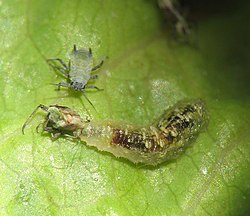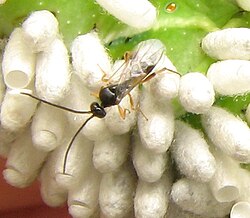ജൈവകീടനിയന്ത്രണം
ജൈവികനിയന്ത്രണം Biological control മറ്റു ജീവികളെ ഉപയോഗിച്ച് പ്രാണികൾ, മൈറ്റുകൾ (മൂട്ടകൾ), കളകൾ തുടങ്ങിയവയെ നിയന്ത്രിക്കുന്നതിനെ ആണ്.[1] ഈ രീതി, ഇരതേടൽ, പരാദജീവിതം, സസ്യഭോജിത്വം അല്ലെങ്കിൽ അതുപോലുള്ള രീതികളെ ആശ്രയിക്കുന്നു. മനുഷ്യന്റെ ഇടപെടലിലൂടെ യാണ് ഇത്തരം കീടനിയന്ത്രണം സദ്ധ്യമാകുന്നത്. ഇന്റഗ്രേറ്റഡ് പെസ്റ്റ് മാനേജുമെന്റ് സംവിധാനത്തിന്റെ പ്രധാന ഭാഗമാണിത്.


ചരിത്രം
തിരുത്തുകവിവിധ രീതിയിലുള്ള ജൈവികനിയന്ത്രണം
തിരുത്തുകപ്രധാനമായും മൂന്നു തരത്തിലുള്ള അടിസ്ഥാനപരമായ ജൈവികനിയന്ത്രണ സംവിധാനങ്ങളാണുള്ളത്: ഇമ്പോർട്ടേഷൻ (പരമ്പരാഗതമായ ജൈവികനിയന്ത്രണം), ഓഗുമെന്റേഷൻ, കൺസർവേഷൻ[2]
ജൈവിക നിയന്ത്രണകാരികൾ
തിരുത്തുകമിത്രകീടങ്ങൾ
തിരുത്തുകഇവയും കാണുക
തിരുത്തുക- Beneficial insects
- Biological pesticide
- Chitosan
- Companion planting
- Insectary plants
- International Organization for Biological Control
- Inundative application
- Japanese beetle
- Mating disruption
- Nematophagous fungus
- Organic gardening
- Organic farming
- Pest control
- Permaculture zone 5
- Sterile insect technique
- Sustainable farming
- Sustainable gardening
- Zero Budget Farming
അവലംബം
തിരുത്തുക- ↑ Flint, Maria Louise; Dreistadt, Steve H. (1998). Clark, Jack K. (ed.). Natural Enemies Handbook: The Illustrated Guide to Biological Pest Control. University of California Press. ISBN 978-0-520-21801-7. Archived from the original on 15 May 2016.
{{cite book}}: Unknown parameter|last-author-amp=ignored (|name-list-style=suggested) (help) - ↑ "What is Biological Control?". Cornell University. Archived from the original on 13 June 2016. Retrieved 7 June 2016.
കൂടുതൽ വായനയ്ക്ക്
തിരുത്തുക- Wiedenmann, R. (2000). Introduction to Biological Control Archived 2011-08-10 at the Wayback Machine.. Midwest Institute for Biological Control, Illinois.
- Cowie, R. H. (2001). "Can snails ever be effective and safe biocontrol agents?"" (PDF). International Journal of Pest Management. 47 (1): 23–40. doi:10.1080/09670870150215577. Archived from the original (PDF) on 2010-10-11. Retrieved 2018-01-22.
- R. James Cook (September 1993). "Making Greater Use of Introduced Microorganisms for Biological Control of Plant Pathogens". Annual Review of Phytopathology. 31 (1): 53–80. doi:10.1146/annurev.py.31.090193.000413. PMID 18643761.[പ്രവർത്തിക്കാത്ത കണ്ണി]
- U.S. Congress, Office of Technology Assessment (1995). "Biologically based technologies for pest control" (PDF). US Government Printing Office, Washington, DC.
{{cite journal}}: Cite journal requires|journal=(help) - Felix Wäckers; Paul van Rijn; Jan Bruin (2005). "Plant-Provided Food for Carnivorous Insects – a protective mutualism and its applications". Cambridge University Press, 2005. ISBN 978-0-521-81941-1.
{{cite journal}}: Cite journal requires|journal=(help); Unknown parameter|lastauthoramp=ignored (|name-list-style=suggested) (help)
- Effects on native biodiversity
- Pereira, M.J. et al. (1998) Conservation of natural vegetation in Azores Islands. Bol. Mus. Munic. Funchal 5, 299–305
- Weeden, C.R., A. M. Shelton, and M. P. Hoffman. Biological Control: A Guide to Natural Enemies in North America.
- Cane toad: a case study. 2003.
- Humphrey, J. and Hyatt. 2004. CSIRO Australian Animal Health Laboratory. Biological Control of the Cane Toad Bufo marinus in Australia
- Cory, J.; Myers, J. (2000). "Direct and indirect ecological effects of biological control". Trends in Ecology & Evolution. 15 (4): 137–139. doi:10.1016/s0169-5347(99)01807-8.
- Johnson, M. 2000. Nature and Scope of Biological Control. Biological Control of Pests.
- Effects on invasive species
- Cofrancesco, A. 2007. U.S. National Management Plan: An Action Plant for the Nation- Control and Management Archived 2011-09-02 at the Wayback Machine.. Army Corps of Engineers.
- Economic effects
- Griffiths, G.J.K. 2007. Efficacy and economics of shelter habitats for conservation. Biological Control: in press. doi:10.1016/j.biocontrol.2007.09.002
- Collier T. and Steenwyka, R. 2003. A critical evaluation of augmentative biological control. Economics of augmentation: 31, 245–256.